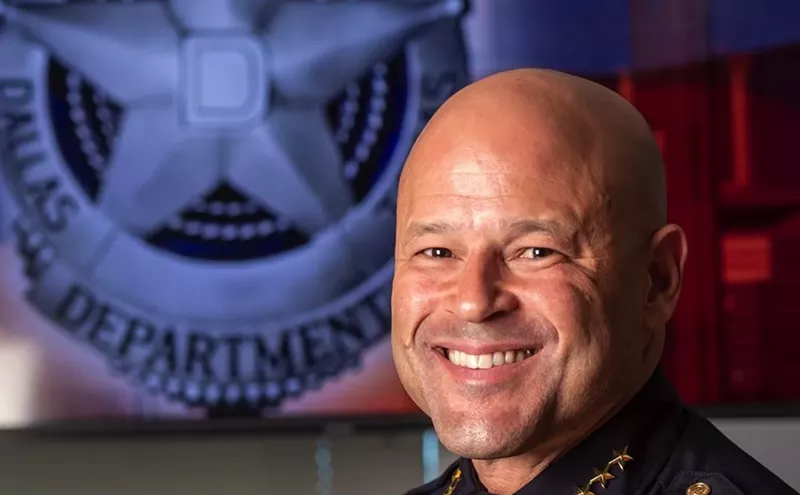Gladden dresses more like a disheveled Clark Kent than a dashing Bruce Wayne. He’s been busy lately, taking more than a dozen cities to court for passing sex offender residency restriction ordinances that have left many families without homes.
“It’s regrettable that people can’t get past their bias and prejudice that they have for an entire class of people,” says Gladden, sitting in his law office a few blocks away from Texas Woman’s University in Denton. “I don’t have a problem with people making judgments on a case-by-case basis. But I really hate seeing people who are so ignorant that they would decide that a whole class of people should be treated unfairly.”
Defending sex offenders, of course, isn’t a childhood dream come true. Gladden's first ambitions were of shredding onstage like jazz legend Django Reinhardt. His older sister introduced him to the Beatles when he was 13 years old. He picked up an acoustic guitar, took a few lessons and, a year later, upgraded to a Gibson ES 335, an electric guitar in the family of B.B. King’s old Lucille.
Once he picked up the electric, it didn’t take long for him to start wowing the crowd with his guitar-slinging skills. He played mostly high school talent shows, then won an outstanding musician award at a competition held at the University of Texas at Arlington. After high school, like many other jazz musicians in the early ‘80s, he headed to Denton to study jazz at North Texas State University, taking part in the jazz revival occurring four nights a week on Fry Street.
Fry Street in the early ‘80s was much different than the apartment-filled infestation it’s become today. It was a musical wonderland where Brave Combo played regularly at the Star Club, draft pitchers were only $2 and free chips and salsa satisfied one’s appetite for the evening. It was the place to be on Thursday nights when a mass of students would show up to hit the bars.
It was sometime in early April when Gladden’s dream ended. It would happen around midnight when the bars were closing. Both campus and city police officers, he says, would wait outside for the bars to empty, then start randomly arresting students. Gladden was arrested seven times for refusing to disperse, he says and recalls sometimes shouting out, “Don’t worry. Everybody watching will be our witnesses” before officers placed him in handcuffs, too.
In those days, the magistrate wouldn’t come to arraign misdemeanor cases even though he was required to do so, Gladden says, since an arrest warrant affidavit hadn’t been signed. He and other people would either post the $200 bond to get out of jail or sit out the fine at $5 a day. Gladden’s friends gathered money a few times to bail him out of jail, and he’d wait for the trial date, sometimes pestering the court clerk about it, but it would never come around.
The final time he was arrested, Gladden decided to sit it out in jail until he could see the judge. Eighty-seven hours later, his father, Don Gladden, a well-known civil rights attorney and former legislator from Fort Worth, showed up to the Denton jail to find out why his son hadn’t received his phone call or if a probable cause warrant had been executed. It hadn’t, a clear violation of his son’s Fourth Amendment right.
“They got their judge up real quick and up to the police department,” Gladden says.
Gladden’s father took his son’s case but not before eliciting a promise that Gladden would hurry up and graduate with his degree in music. He agreed, and his father sued and later won the case by revealing that the police working the night shift were not only unlawfully arresting people, Gladden says, but also pocketing the $200 cash bond instead of turning it over to the city.
Gladden didn’t realize his dream of becoming a jazz guitarist had ended on Fry Street in the early ‘80s. It took him a year to realize it. He’d gone to California with an achin’ in his heart, as Led Zeppelin would say, not long after he graduated North Texas State University. He worked several odd jobs, including one at a large photocopy company where he’d run into celebrities like Herve Jean-Pierre Vilechaize, who played Tattoo on the TV show Fantasy Island.
But California dreamin’ wasn’t panning out for Gladden, who ran into several North Texas musicians who were still waiting tables a decade after their arrival in the golden state. He didn’t want to waste a decade of his life running down a dream that may not happen, so he headed back to Texas where he decided to follow in his father’s footsteps and enrolled in law school.
“I just felt there was more of a need for lawyers in Denton than a guitar player,” he says.
An old family friend first introduced Gladden to defending sex offenders’ civil rights. William “Bill” Habern called him about taking a case involving the parole board denying a sex offender visitation with his five-year-old son.
Habern was no stranger to defending civil rights. He’d made a name for himself when he tackled a Texas prison in court back in the early ‘70s for using inmates as dog bait to train its chase dogs. “These were Blue Tick hounds, serious dogs,” Habern says. The inmate, he says, would be ordered down to fight with the dogs, and a couple of his clients had 120 bites on them.
He won that case when he was still in his prime. But in 2006, when Habern learned about the case involving the parole board and the sex offender (whose sex offense involved a prostitute, not a child), he was 68 years old. He needed someone to help him, so he called Gladden and told him, “I don’t think [the parole board] can terminate this guy’s parental rights without a due process hearing.”
They filed the lawsuit in federal court in Austin, never discussing who would be the lead attorney on the case. As soon as the judge came out, Gladden taps Habern on the leg, indicating that he’d address the judge. “He stood up and just nailed it,” Habern says. “From that point forward, he was lead counsel.”
After they won the lawsuit against the parole board — the state surrendered — Gladden and Habern began discussing another situation involving the parole board placing people on sex offender supervision even though they did not have a sex offender conviction.
“We ended up having to try that case twice because the judge got so mad,” Habern says and laughs.
They won that case, too.
Habern then introduced him to Texas Voices for Justice and Reason, a statewide sex offender advocacy group that the older attorney had done a lot of pro bono work for in the past. Gladden surpassed the group's expectations, winning several cases in court and filing several more, including his most recent case against 14 small Texas towns for passing sex offender residency restrictions without the state authority to do so.
Like the old Blue Tick hounds, Gladden doesn’t quit once he picks up the scent of a civil rights case, and he quickly became a critic of sex offender treatment and the wall of fear that some in the news media, Habern says, helped to create.
Gladden attributes his willingness to see past a person’s sex offense to his exposure as a child to his father’s clients, who would often work off their legal bills doing odd jobs around his house. Over the years, he’s visited sex offenders in places like a small motel room where one of his clients lived with his family, cooking food on hot plates and using storage buildings as closets.
The term sex offender, he points out, applies to a wide range of sex crimes, from the obvious — a dirty old man in a raincoat assaulting a child, a school worker having an inappropriate conversation in a chat room with an under-aged girl — to the not-so-obvious, like a 24-year-old man who slept with a 22-year-old woman who later turns out to be a 15-year-old girl.
Sex offenders are also divided into three risk categories: Level 1, an offender who poses a low danger to the community; Level 2, an offender who poses a moderate danger to the community; and Level 3, an offender who poses a serious danger to the community.
But don't let the state's risk levels assure you. Low-risk offenders could still have molested a child or, in some cases, children. One low-risk offender in Lubbock was convicted of three counts of aggravated sexual assault of a 7-year-old girl, according to a local news report.
Gladden’s current case involves a well-known preacher’s 19-year-old son, who was caught with a young girl whom he thought was 16 but later found out was only 13 years old when the police discovered them together in a car at the park.
The preacher, who wishes to remain anonymous, says that his son had met the girl online in 2002 and didn’t know she was only 13. An officer caught them making out in a park, and his son admitted to putting his hand down her pants. He received deferred adjudication for the crime but still had to register as a sex offender.
“If I had known that, I would have never allowed him to take the deal,” the preacher says.
The sex offender registration would later come back to haunt his son, who became a minister in his father's ministry. In 2014, they moved to Hickory Creek, one of the small towns that Gladden is currently suing over its sex offender residency ordinance. The son went to update his registry only to learn that he couldn’t live with his family because their new home was located within 2,000 feet of a daycare center, a clear violation of the city's ordinance. They hired Gladden soon after making the discovery.
“Instead of saying all sex offenders, why don’t the ordinances specifically target the monsters who fondle children?” the preacher asks. “It’s not a case-by-case basis. It’s blanketed.”
Gladden agrees with his client. He says cities need to repeal all their ordinances, then hold hearings on a case-by-case basis. This would be similar to someone whose license faces suspension, which requires the government to hold an administrative hearing.
"The burden would be on the local government to show up and produce evidence that the person poses a threat by the reason of lack of sexual control," Gladden says. "But the likelihood that someone will be found as a sexual threat to the community is very low. I don't know if it's worth the resources."












